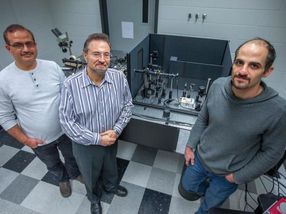How to boost Hispanics' participation in clinical trials?
Researchers create culturally targeted educational materials aimed at empowering Spanish patients to make health care decisions
Hispanic cancer patients rarely participate in clinical trials, but researchers want to tailor a Spanish DVD to help change this. To create a relevant educational tool, Moffitt Cancer Center researchers investigated why awareness of and participation in trials are so low in this population.
Using focus groups with 36 Spanish-speaking cancer survivors from Tampa and Puerto Rico, researchers found that a language barrier, as well as a cultural idea that only doctors, not patients, guide treatment decisions, may help account for low participation rates.
Looking for ways to improve knowledge and participation for Hispanic patients, the researchers used feedback from the focus groups to help develop a Spanish booklet and video to educate and empower patients to participate in treatment decisions.
The study was published online in May by the Journal of Health Communication: International Perspectives.
The 45.5 million Hispanics living in the United States are the nation's fastest growing ethnic group, and there is a need to develop health care educational materials that target their language and culture. These educational materials should not be merely translated from English, the researchers said, but should be adapted to meet the group's informational needs in a culturally appropriate way.
"We found that Hispanic patients who prefer information in Spanish had different informational needs and concerns than non-Hispanic patients," said study lead author Gwendolyn P. Quinn, Ph.D., scientific director of the Survey Methods Core Facility and member of the Health Outcomes and Behavior Program at Moffitt. "Keeping that in mind, we developed educational materials using a social marketing approach, which targets a specific audience instead of creating a generic product for everyone. This approach increases the chances a patient may relate to the material, making their behavior change more likely."
The social marketing intervention in this study was aimed at increasing clinical trial participation by Hispanic patients. However, the researchers found several examples of culturally based ideas that may have kept patients from enrolling in a clinical trial. For example, there was confusion among Hispanic patients over why a doctor would ask them to make a treatment decision, such as participating in a clinical trial. The prevailing cultural idea, they found, was that Hispanic patients had a core belief that the doctor will tell them what to do. Also in Hispanic culture, the patient relies on his or her family to help make health care decisions.
Their research shows a need to present culturally tailored information for specific audiences. The researchers are using the Spanish video and booklet in a randomized clinical trial to evaluate the effectiveness in improving the clinical trials perceptions of Spanish-speaking cancer patients.
"We feel the educational materials we developed will empower Hispanic patients by improving their capacity to make health care decisions, such as enrolling in a clinical trial," explained Quinn. "They may say no, but they will be prepared with knowledge about the purpose of clinical trials and will not be making an uninformed decision."
Most read news
Organizations
Other news from the department science

Get the life science industry in your inbox
By submitting this form you agree that LUMITOS AG will send you the newsletter(s) selected above by email. Your data will not be passed on to third parties. Your data will be stored and processed in accordance with our data protection regulations. LUMITOS may contact you by email for the purpose of advertising or market and opinion surveys. You can revoke your consent at any time without giving reasons to LUMITOS AG, Ernst-Augustin-Str. 2, 12489 Berlin, Germany or by e-mail at revoke@lumitos.com with effect for the future. In addition, each email contains a link to unsubscribe from the corresponding newsletter.























































